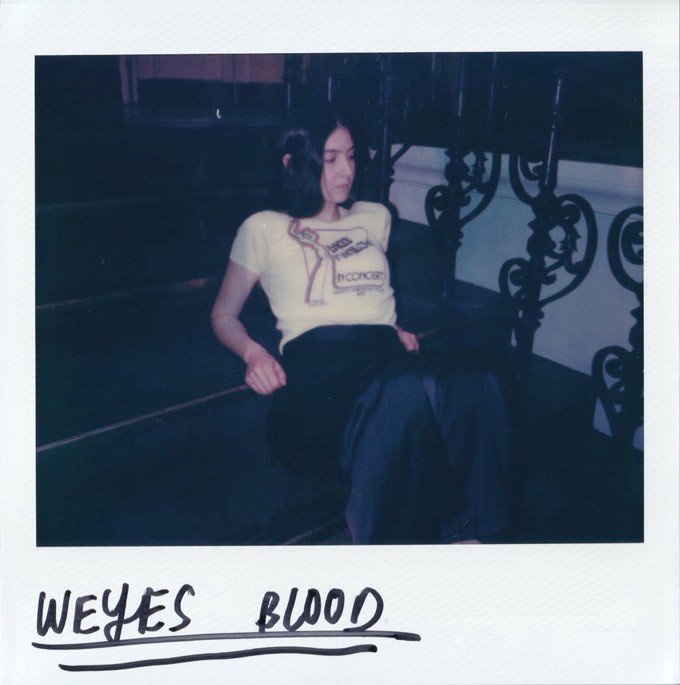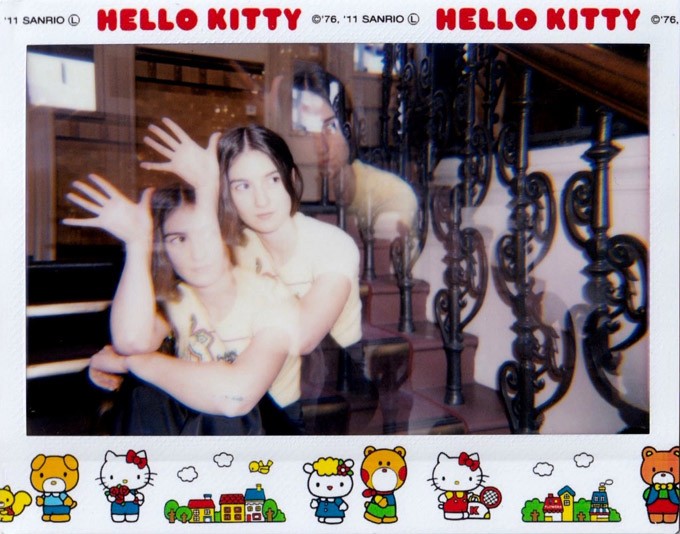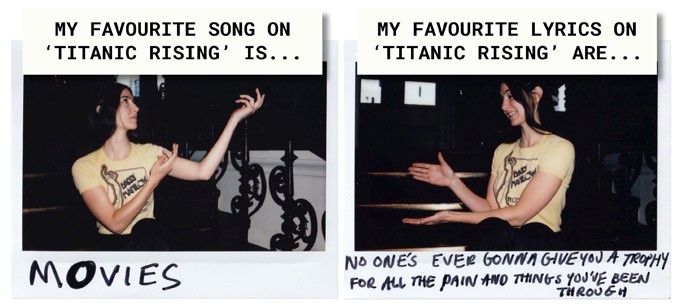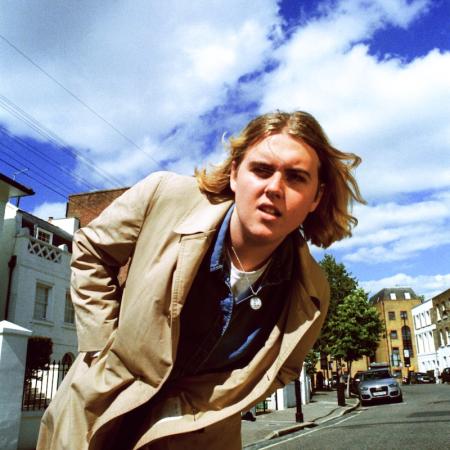Just under four months ago, Weyes Blood was performing on-stage at Auckland's Town Hall, wrapping up a tour across Australia and New Zealand with Aldous Harding which marked one of the last live shows to take place globally. After an introduction of elbow bumps in lieu of handshakes, Weyes (real name: Natalie Mering) is hyperaware of their fortuitous timing: "We're so lucky. We just barely made it. Like, I think they're going to start cancelling shows here maybe next week. Tomorrow's our last show and it's kind of remarkable, we've been beating everything by a day. If we had played New Zealand before Australia, we would have had to cancel shows. I mean, we cancelled shows in April and May, but it was amazing to get this tour."
Her fourth studio album 'Titanic Rising' was released in April of last year to critical acclaim, with Pitchfork declaring it "a grand, sentimental ode to living and loving in the shadow of doom." From the serene and nostalgic opener 'A Lot's Gonna Change' to a cry for meaning in 'Something To Believe', the ten-track album offers wisdom about growing up, love, relationships, and more.
We spoke with Weyes Blood in Auckland before her performance at the Town Hall, in what was our last ever in-person interview before the global quarantine began...

COUP DE MAIN: In 'A Lot's Gonna Change' you talk about the changes that happen as we grow older. I love the lines: "When I had the whole world / Gently wrapped around me / And no good thing could be taken away." Why do you think that the time of youth and innocence, before growing up, can feel so comforting and safe?
WEYES BLOOD: I think it's maybe before you realise that your parents are just human beings and they're kind of these infallible authorities on the world, and their job is to comfort you. My dad was very comforting. I think that as a little girl, I would kind of be like, "What's this?" My parents are really Christian, so they'd be like, "Jesus is coming back; the rapture, it's the end of the world," and I'd be like, "Well is Jesus gonna let me grow up and go through puberty and get married?" And they'd be like, "Yes," and then I'd be like, "Phew okay." Or I thought about environmentalism in the 90s and about pollution. So I was like, "Are we going to clean up this mess?" And they were like, "Yeah, we will." There's just like a lot of faith in institutions and faith in what your parents tell you, and that kind of that warmth. I think I was constantly questioning them and they were constantly reassuring me, and I think you reach a certain age where that doesn't happen anymore, and you can kind of see their fallacies and their beliefs and you start to see them for what they are.
CDM: Do you have a memory of when that happened for you?
WEYES BLOOD: Kind of in puberty. I went to a crazy Jesus camp when I was ten years old. I renounced Jesus at the camp because everybody was getting full of the Holy Spirit and flipping out. I'd pray and pray, and I felt nothing. So I was like, "Fuck you, Jesus! You didn't fill me with your ecstatic experience." Then the next day, I got my period. I became a woman. Jesus was like, "Hey, all right woman!" I'm not a dogmatic Christian, but I do think I believe in the symbols and I do think that that was a very interesting turning point in my life, that camp and getting my period and becoming a woman and kind of being ushered away from that constant reassurance and starting to question everything.
CDM: "We all want something new / But can't seem to follow through," you say in 'Andromeda'. Do you think a fear of commitment is in human nature?
WEYES BLOOD: I think people have a fear of commitment because there's this kind of false sense of choice that the internet and TV and movies kind of project onto us. Also, our culture really caters to isolationism because you don't really need the help of somebody to eat; you can just order food and can just order something online. In a lot of ways, everything is gearing towards people not needing other people. Everyone's supposed to have their career and be independently wealthy. Everybody's supposed to follow their bliss, and I think that makes commitment trickier and a lot more difficult. So people have become not less committed, but we've committed to our individuality.
CDM: What was running through your mind when you were writing the third verse, "True love is making a comeback / For only half of us, the rest just feel bad"?
WEYES BLOOD: There are millennials still getting married. There are still people that fall in love. And yeah, there's definitely a sense amongst artists and people who live in big cities that it's not happening, but it's happening elsewhere still. So it's important when we kind of get into these headspaces to remember there are still normal people just getting married and making babies.
CDM: Why do you think that love and getting married, that normality around having that set structure in your life is something that humans also crave?
WEYES BLOOD: I think because pair-bonding is biological. I think that we need other people, and biologically, we definitely need close relationships and human touch and affection. It's a survival thing; it's built into our program. Marriage is an institution based around that biology, even though it might be flawed. I still think it's based around that closeness. The flawed aspect I think is the suburban isolationism where it's just two people and pair-bonding is probably more like a tribal thing, like a little family or community. That's the ultimate biological resonance zone. But it starts with pair-bonding. And I think we've been pair-bonding since the dawn of homo sapiens. This is also something that Desmond Morris, the zoologist, wrote a book about called 'The Naked Ape', which I really believe in. The reason that pair-bonding became so important is that in order to optimise reproduction - because women had to spend ten plus years with the child, it's not like it was three years and then they're an adult, children take so long to become grown-up - it created a situation where to optimise population, they had to start distributing females democratically and not isolating all the males because the males really had to work together to hunt big animals. So you needed to have five men in a crew all getting along. There couldn't be one guy that gets all the girls. So I think they started pair-bonding. And I really believe that biologically it was a part of our survival being a community-based hunting creature.


CDM: Do you think that love is the strongest human emotion? Do you think there are other emotions that can also be as strong?
WEYES BLOOD: Yeah. I think there are maybe six core emotions - fear, love, anger, joy, grief, hunger. <laughs>
CDM: I love the sentiment of 'Something To Believe', it’s so relatable - especially in the world we live in today. Why do you think that humans have always looked to something bigger to believe in the world? Do you think it ties back in with that idea of comfort? It’s also interesting how it’s so tied in with the idea of community, and being in the same situation as other people.
WEYES BLOOD: Yeah, and I also think that when culture and masses of humanity started happening, it became really popular to have myths to explain reality as a form of psychological peace because we're starting to get smarter. So as soon as we could really fully conceive of the notion of death, and we started burying our dead, I think that's the beginning of myth, where we had to create these archetypes and stories to psychologically function because our brains are getting so big. Being as smart as we are, you can't just play it like a monkey, you have to have something that you believe in to keep you away from that mortal fear and that void of consciousness.
CDM: "The meaning of life doesn't seem to shine like that screen," from 'Movies' is such an interesting lyric to think about. Have movies and TV shows become a sort of modern-day religion into themselves?
WEYES BLOOD: Yeah, they're modern-day myths. Which is sad because they're not as thoughtful - but not always, sometimes they are, but they're also just kind of capitalist fluff. But I do think that it's become such a huge part of how we cope with reality, it's a big escape, and it's a big part of everybody's lives.
CDM: In 'Mirror Forever' you say, "I'm a dreamer and you're a tiger / Got a feeling our romance doesn't stand a chance." Pop-culture has conditioned us into believing that opposites attract, but do you think those differences in character are sustainable in real-life?
WEYES BLOOD: Yeah, I do think that that can work. I mean, it just depends on what's opposite. People that are super Type-A and are together with somebody who's really loosey-goosey who can't get it together, they could really work together, or they could just fight about it. There are other factors. But I think opposites attracting is real, down to the physics level. But opposites can repel each other as well, it depends. And people that are really similar, I find sometimes actually have more issues sometimes, because they both perpetuate each other's downsides.
CDM: On a 'Mirror Forever' related note ("No one's ever gonna give you a trophy / For all the pain and the things you've been through…"), I love that a fan gave you a trophy at a show back in July of last year! Do you still have it?
WEYES BLOOD: Yes! It's in my apartment. It's up there. I look at it every day - somebody gave me a frickin' trophy! I was so grateful.

Weyes Blood's album 'Titanic Rising' is out now - watch the 'Wild Time' music video below:











